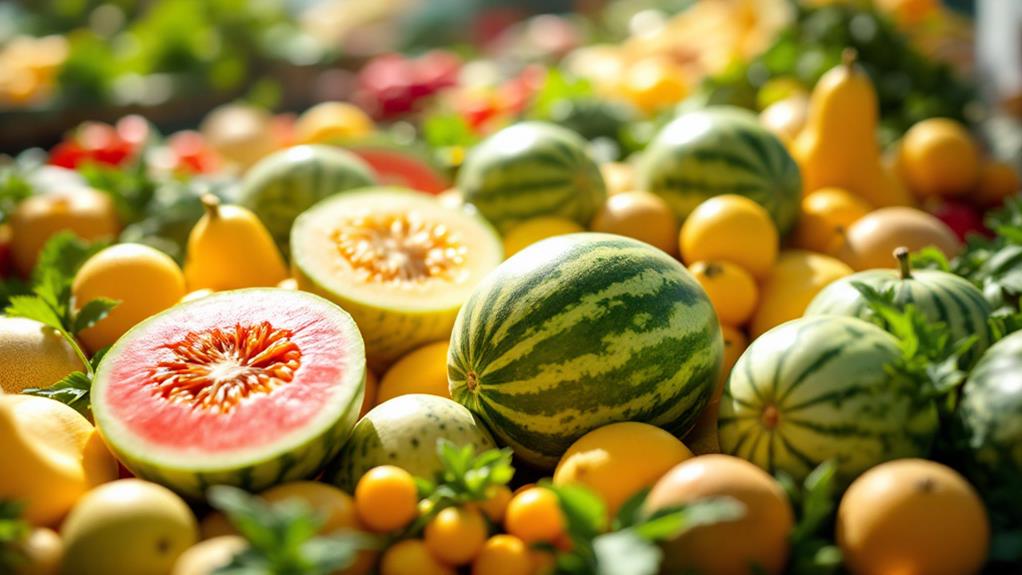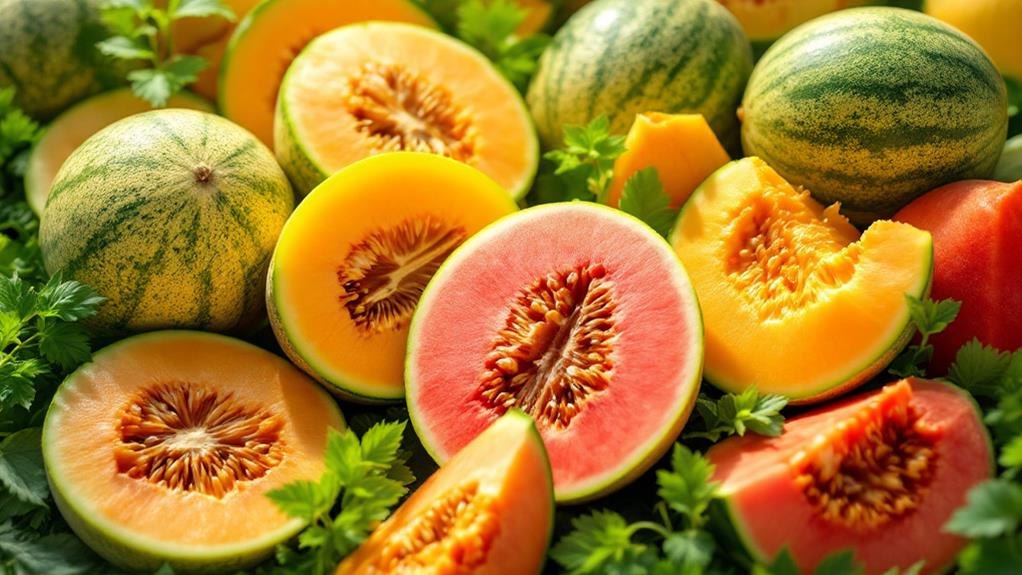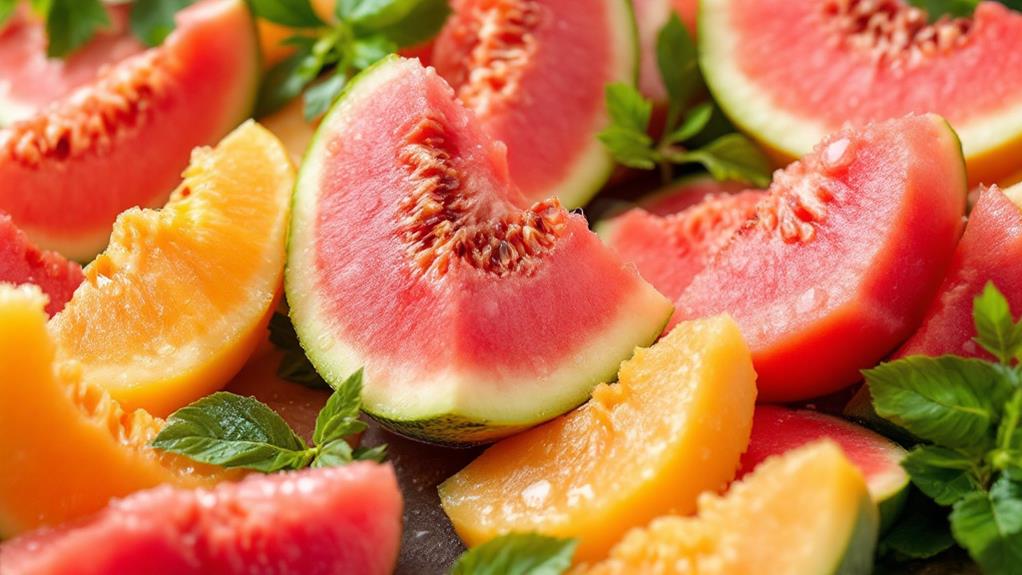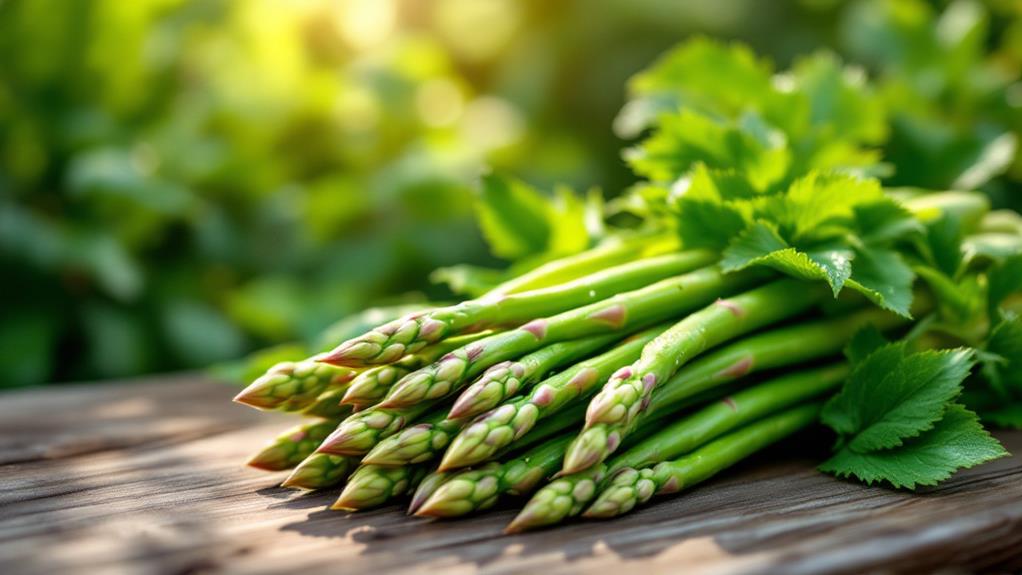A Complete Guide to the Types and Health Benefits of Melons

You'll love uncovering the variety and health benefits of melons. Enjoy cantaloupe, honeydew, and watermelon, each offering a unique taste and rich nutrients like vitamins A and C. These melons are great for hydration, weight management, and promoting healthy skin due to their high water content and antioxidant properties. Watermelon stands out with its lycopene, linked to reduced prostate cancer risks. Picking a ripe melon involves checking for firmness and sweet aroma. Once cut, store them in the fridge to maintain freshness. From fruit salads to smoothies, melons are versatile and nutritious. There's so much more to investigate.
Types of Melons
In terms of melons, there are several popular varieties you might enjoy. Cantaloupe stands out with its soft orange flesh and signature wart-like skin. It's not only sweeter than watermelon but also a powerhouse of vitamins A and C, offering numerous health benefits through its antioxidants. If you're seeking a melon rich in potassium, honeydew melon is a great choice. With its bright yellow skin and sweet flesh, it surpasses watermelon in potassium and beta-carotene content, making it a nutritious and delicious option.
Watermelon, however, is your go-to for hydration, as it's composed of about 95% water. At only 46 calories per cup, it's the lightest melon and boasts a rich content of lycopene, providing antioxidants that contribute to its red color and numerous health benefits. Galia melon, a hybrid of Ogen and Honeydew, surprises with a unique flavor combining sweetness and spice. It's low in calories and rich in vitamin A, making it a delightful treat.
Lastly, Santa Claus melon, or Christmas melon, captivates with its thick rind and juicy flesh that sweetens as it ripens. It's perfect for fresh fruit salads, offering a revitalizing burst of flavor.
Nutritional Comparison
When exploring the nutritional profiles of different melons, you'll find each variety offers distinct benefits that cater to diverse dietary needs. Cantaloupe stands out with 53 calories per cup, delivering a whopping 106% of your daily vitamin A and 95% of your vitamin C needs. These vitamins, along with antioxidants, play a significant role in protecting your body from harmful free radicals and promoting general health.
Honeydew, with 60 calories per cup, provides 51% of the daily value for vitamin C and 11% for potassium. It's also a source of fiber and vitamin B6, making it a nutrient-rich option. These nutrients support hydration and are fundamental in maintaining blood pressure and metabolic functions.
Watermelon offers the lowest calorie count at just 46 per cup. It's packed with lycopene and contains vitamin A, C, and potassium. These components not only aid hydration but also improve your body's defense against chronic diseases such as heart disease and cancer.
All three melons, with their high water content, make excellent low-calorie snacks that contribute to hydration and weight management. Their antioxidant properties and necessary vitamins offer significant health benefits, potentially reducing chronic disease risks.
Health Benefits

Melons offer a multitude of health benefits, making them a fantastic improvement to your diet. They're low in calories, with cantaloupe at 53 calories per cup and watermelon at just 46, which makes them perfect for weight management. Their high water content, about 90%, elevates hydration, supporting digestion and helping to prevent dehydration-related issues. This is vital for your comprehensive health, especially during hot weather or intense physical activities.
Vitamin C is abundant in melons, with cantaloupe providing 95% of your daily value per cup. This powerful antioxidant supports your immune system, helping you ward off illnesses. Furthermore, the vitamin A in cantaloupe, which covers 106% of your daily needs, is fantastic for skin health, giving your skin a natural glow and potentially reducing signs of aging.
Watermelon is rich in lycopene, an antioxidant associated with reduced risks of prostate cancer and improved cardiovascular health. Regular consumption of melons, packed with these necessary nutrients and antioxidants, may lower your risk of chronic diseases, including heart disease and certain cancers. By incorporating melons into your meals, you're not just enjoying a sweet treat, but also taking a step toward better health.
Antioxidant Properties
You'll find that melons pack a powerful punch concerning antioxidant properties. These hydrating fruits, like cantaloupe and watermelon, are loaded with antioxidants such as beta-carotene and lycopene. They play an important role in combating free radicals and reducing oxidative stress in your body. Cantaloupe is particularly rich in beta-carotene, which your body converts into vitamin A, vital for vision and reproductive health. On the other hand, watermelon boasts a high content of lycopene, a powerful antioxidant linked to a decreased risk of prostate cancer.
The diverse antioxidant profiles in melons offer a unique combination of nutrients, enhancing their comprehensive health benefits. By including melons in your diet, you can potentially lower the risk of chronic diseases. Regular consumption of these antioxidant-rich fruits is associated with a reduced risk of cardiovascular diseases and certain cancers. Their protective role in health cannot be overstated, as they help decrease oxidative stress and inflammation.
Studies suggest that a higher intake of foods rich in antioxidants, like melons, promotes general health and longevity. So, including these delicious and nutritious fruits in your diet can be a tasty way to enhance your wellness.
Hydration and Skin Health

While enjoying the juicy sweetness of melons, you're also reaping considerable hydration benefits. With melons composed of approximately 90% water, they are excellent for hydration, especially during hot weather. Their high water content helps you maintain energy levels and prevents dehydration-related issues, like kidney stones. By including melons in your diet, you're effectively meeting your daily hydration needs through food intake.
Beyond keeping you hydrated, melons considerably improve skin health. They're packed with vitamin C, a crucial nutrient that promotes collagen production. Collagen is fundamental for maintaining skin elasticity and aiding in wound healing. When you consume melons regularly, you're helping your skin stay supple and moist, which can improve general skin appearance and combat signs of aging such as wrinkles.
Because melons are nutrient-rich, they make for healthy snacks that support both hydration and skin health. By indulging in these invigorating fruits, you're not only quenching your thirst but also contributing to a more youthful, radiant skin look. So, the next time you reach for a snack, consider melons, and enjoy the dual benefits of hydration and improved skin health.
Choosing the Perfect Melon
Have you ever wondered how to pick the perfect melon? When choosing melons, focus on firmness and guarantee there are no bruises. A firm texture signals quality and freshness. Look for melons that feel heavy for their size, as this often indicates juiciness and proper ripeness. A heavy melon suggests it's packed with sweet, delicious juice, enhancing your eating experience.
When selecting watermelons, a yellow belly is a good sign—it means the melon ripened better in the field, elevating its sweetness and flavor. For honeydew melons, the more pronounced the yellow color, the riper and sweeter the fruit will be. Remember, sweetness often comes with ripeness, so these visual cues are your best friends in choosing wisely.
Don't forget to check for a uniform shape. This typically indicates even growth and, consequently, consistent quality. A pleasant aroma is another key indicator of a melon's ripeness and general quality. Avoid those with soft spots or dull skin, as these may be overripe or spoiled. By following these tips, you can guarantee you're bringing home melons that are perfectly ripe and bursting with sweetness.
Prepping and Storage Tips

Handling melons properly guarantees you get the most out of their juicy sweetness and nutritional benefits. Start by storing uncut melons at room temperature to maintain their freshness until you're ready to enjoy them. Before cutting, wash your melons thoroughly under running water and scrub their exteriors to remove any contaminants that could transfer to the flesh.
Once you've cut your melon, regardless of whether it's a cantaloupe, honeydew, or watermelon, remove the fruit from the rind and place it in airtight containers. This step is essential for refrigeration, where the cut melons will stay fresh for up to five days. If you've got cut watermelon, be sure to tightly cover it with plastic wrap. This helps maintain its freshness and prevents it from absorbing any odors from other foods in your refrigerator.
For ideal storage, keep your melons away from ethylene-producing fruits like bananas and apples, as these can cause your melons to ripen prematurely. By following these prepping and storage tips, you maintain the quality and taste of your melons, ensuring they remain a delightful enhancement to your meals.
Creative Serving Ideas
In regards to serving melons, beyond just slicing and eating them fresh, there are plenty of creative ideas to investigate. Melons are not only invigorating but also packed with hydration and vitamin C, making them perfect for a variety of delicious recipes. Why not start your day with a melon-infused smoothie? Toss fresh melon chunks into your blender for a nutrient increase. Combining the hydrating properties of watermelon and the vitamin-rich benefits of cantaloupe and honeydew creates a revitalizing and healthy drink.
Here are some creative serving ideas to try:
- Grill slices of cantaloupe or honeydew: Grilling amplifies their natural sweetness. Serve them as a side dish with proteins or as a dessert topped with ice cream.
- Colorful melon kabobs: Skewer chunks of cantaloupe, honeydew, and watermelon with grapes and cheese. This makes a fun, nutritious snack perfect for gatherings.
- Melon-infused water: Add slices of melon to your water, creating a rejuvenating, sugar-free beverage. It's an excellent alternative to sugary drinks, increasing hydration.
For a sweet treat, puree ripe melon with sugar and lime juice to make frozen pops, retaining the fruit's vitamins and hydration benefits. These ideas celebrate melons' versatility and deliciousness.




